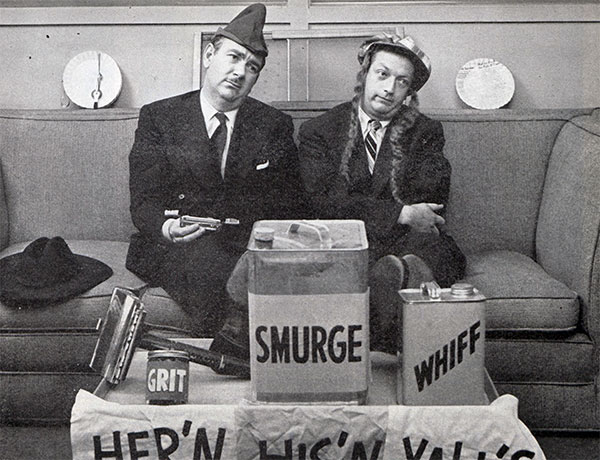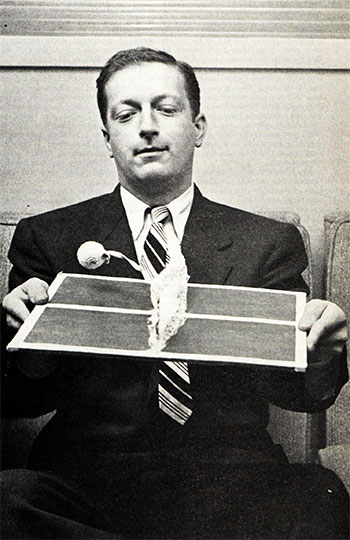Why March Is the Worst
I was visiting with some friends not long ago and the conversation turned to their youthful adventures with alcohol. I don’t drink, so sat quietly listening to their stories, having nothing to add that wouldn’t make me seem prudish. Eventually, one of my friends asked if I had ever been drunk. No, I told him, never had been. I did confess to a weak moment on my 40th birthday when the idea of getting drunk, just once, tempted me, but then I remembered something Garrison Keillor had said and decided against it: “March is the month God created to show people who don’t drink what a hangover is like.” The last thing I need is more March in my life.
It’s an odd coincidence that the worst month of the year, March, is smack dab up against the best month of the year, April. March is soggy winter, cold and gloomy, mud, gray skies, rain down the neck, slush over the tops of shoes. April is the bud on the dogwood, crocuses in the Vornholts’ side yard, pansies planted in the town flowerpots by Ray from the street department. March is the fevered, tossing nightmare. April is waking up and realizing the nightmare wasn’t true, that all is good with the world. April is God’s apology for March, the divine kiss on the existential boo-boo.
Every February, glimpsing March on the horizon, I say to my wife, “Let’s go somewhere warm and sunny next month.”
“I have to work,” she says.
“You have lots of sick days saved up,” I point out. “Let’s go to Tucson and you can phone in sick each morning. They’ll never know.”
“You’re my minister,” she says. “You shouldn’t be encouraging me to lie.”
My wife is too religious for my own good.
We’re still nine long years away from retirement, so are stuck with nine more Marches, which makes me want to leap off the tallest building in our town. Unfortunately, that’s only two stories tall, so I’d probably just break a few bones and lie there on the sidewalk feeling like March, dull and depressed. Ray from the street department, installing the flowerpots, would step over me.
Ray is in high spirits in March. The big snows have come to an end, so he can sleep through the night. No more rising at three to clear the streets. He takes the plow off the town truck, so if snow should arrive uninvited, it has to find the exit door without any help from Ray. He drives the sweeper up and down the streets, removing the sand he spent the previous three months spreading, stopping to inspect each storm drain, anticipating April’s showers. Before our town bought a sweeper, those same showers swept away the sand, but now Ray has interrupted nature’s cycle, which is mostly what he does the year round — removing the snow and then the sand, clipping the grass, rearranging earth, trimming the tree, lighting the dark.
I suppose if I had Ray’s job, I would enjoy March more than I do. He spends the entire month boxing it about the head and shoulders, a jab here, a hook there, until March is stretched out flat on the canvas. I don’t have Ray’s agility and fortitude, so March sneaks in an uppercut and knocks me cold. Every single year.
I come to in April, nudged back to life by the scents and sounds of spring. I feel as if I escaped my winter’s shell and think this is how cicadas must feel, emerging from their husks to go forth and dance and mate and whatever else it is cicadas do once they have shed their brittle armor. It is joy beyond measure to leave behind my wintry cover, to pull off my long johns and shave my beard, to burn the last few pieces of firewood in the kitchen stove, and having moved the clock forward in March, witness the expanded light of April.
There are those people who drink to forget March, but I’m not one of them, fearing I would forget April too, which is more tragedy than I could bear.
Philip Gulley is the author of A Place Called Hope.
This article is featured in the March/April 2017 issue of The Saturday Evening Post. Subscribe to the magazine for more art, inspiring stories, fiction, humor, and features from our archives.
Remembering Bob Elliott (1923-2016)


He signs off the daily radio show by suggesting, “Hang by your thumbs.” (Photo by Larry Fried)
Modern comedy was born in the 1950s. It was an underground revolution in humor that took place while television and movies were still focusing on big-name comedians telling jokes about mothers-in-law and women drivers. The new comedy skewered the hyperbolic pronouncements of advertising, social conventions and pomposity in general. Arguably two of the most important exponents of the new humor were Ray Goulding (to give him top billing for once) and Bob Elliott, who passed away February 3, 2016.
Instead of telling structured jokes with punch lines, Bob and Ray developed an improvisation style that was gently zany and refreshingly unpredictable. If their delivery was soft spoken, the humor was powerfully subversive, particularly in the conformist ’50s.
Their growing number of fans relished their humor of the surreal, but also appreciated the satire beneath it, which parodied the tired conventions of the media: the cliché-ridden sportscaster, the unimaginative ads for products no one needed, and the tedious, overblown soap operas.
In December 25, 1954, the Post profiled the pair in a feature article, “Funniest Pair on the Air?”
As writer George Sessions Perry notes, despite their satirical bent, the pair were “never mean or vicious.” An even greater tribute is that the routines of Bob and Ray are still hilarious today. Following are some selections from the article describing their wry sense of humor.
No Script Whatsoever
Frequently on radio these two men play the parts of a whole stageful of characters, each with his or her own distinct and individual voice and personality. The feat appreciably adds to the enjoyment of those listeners who, with a sense of being on the inside, know that all those voices emanate from only two men. Their accomplishment becomes all the more incredible when you know that the performance, which is always smartly paced, is done with no script whatever. This flowering of multiple characters, adorned with an endless variety of human foibles, represents the natural spontaneous effervescence of two brilliantly creative young minds.
Ad Parodies
Philip Hamburger, television critic of The New Yorker, recently noted: “Bob and Ray generally finish up their programs with a plug for one of their seemingly endless supply of imaginary products. The other night it was Woodlo, a product ‘all America is talking about.’ Speaking rapidly. Bob and Ray said that Woodlo was the sort of product ‘that appeals to people who.’ Moreover, it was ‘immunized.’ ‘You can buy Woodlo loose!’ one of them cried. ‘Yes, mothers and dads!’ cried the other. ‘Available at your neighborhood!’ cried Bob. ‘Drop in on your neighborhood!’ cried Ray.”
Then, there are items which they wish to sell “at laughably low prices” from their “overstocked- surplus warehouse” —for example: sweaters with “O” on them. “If your name doesn’t begin with O, we can have it legally changed for you. Sweaters come in two styles: turtle neck or V-neck. State what kind of a neck you have.” Bob and Ray are concerned nowadays, among other things, with their “Make it Yourself” Kits. “Why buy an expensive, ready-made car, when from our kit, with parts numbered from 1 to 10,000, you can build a 1927 Jewett for $28.35?”
The “Mean Man Kit”
By October, 1951, they’d caused so much stir on the radio that they were offered an evening spot on NBC television. Here’s a sample sketch:
ORGAN THEME
ANNOUNCER: Bob Elliott and Ray Goulding take pleasure in presenting the National Broadcasting Company, which presents the Bob and Ray Show.
Well, friends, Bob and Ray have done it again! In the past, you bought their all-purpose kits … the Burglar Kit, the Amateur Doctor Kit … the Home Brain Surgery Kit … and others too numerous to mention. Now, tonight, direct from their laboratory, Bob and Ray introduce a conspicuous first.
BOB: Are you tired of being nice to people?
RAY: Are you fed up with being a sweetie pie?
BOB: Would you like to get back at people?
RAY: Would you really like to be mean, nasty and lowdown for just a while?
BOB: What you want, then … is the Bob and Ray Mean Man Kit.
RAY: With this you can really be mean … get a load off your chest, and feel good all over again.
BOB: First, is a thing so simple as to be ridiculous … yet very effective. A salt cellar. The point is … that when your hostess is not looking you sneak into the dining room and place this salt cellar, with the top carefully unscrewed, on the dining-room table. Then you say to your host, “Won’t you use the salt first?” (Hands salt cellar to Ray.)
RAY: Thank you very much, Lord Dufflebag. How kind of you. (Ray sprinkles imaginary plate and all salt comes out of cellar.)
BOB: This will cause no end of merriment and will also be the last invitation you’ll have to this house.
RAY: To be mean in the office, we devised this.
BOB: This item is seemingly elementary, but can cause havoc in a well ordered organization. This is what is called in business terms, “an incoming and outgoing mailbox.” A messenger appears in your office several times a day, deposits mail in the incoming section and removes mail from the outgoing section. All you do is to substitute this card for this card. This means that all incoming mail will go out . . . and all outgoing mail will come in.
RAY: Here’s a mean man’s “ phony report card.” Confuse the young ones! When they come home with fairly good report cards . . . say two A’s, four B’s and two C’s . . . you substitute this phony report card … flash it in front of the children’s eyes, and then really give it to them.
BOB: And there you are. Don’t be a good guy all your life. Be just plain mean and nasty once in a while. Get this Mean Man’s Kit by writing NASTY NBC NEW YORK 20, N.Y.
RAY: And say … “I loathe myself.”
MUSIC PLAYOFF